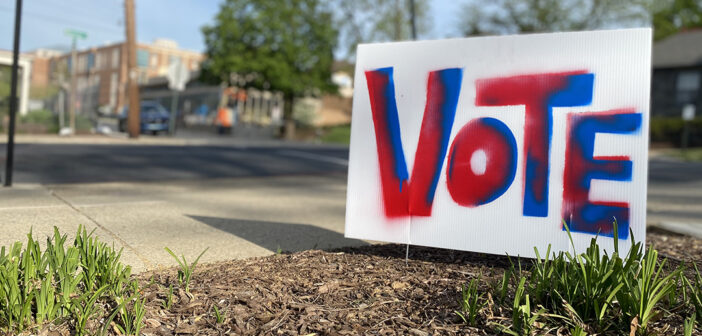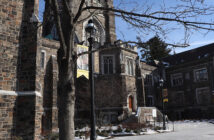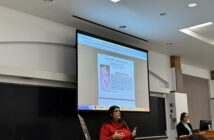Lehigh will not hold classes on Nov. 8 for Election Day. The university observes this day as Civic Engagement Day, which was created to make voting more accessible for students.
Various student organizations are working to create programming for the day that will encourage students to be educated on political discourse. The organizations will be providing free food, hosting discussions and helping students vote.
Civic Engagement Day was made possible because of a petition led by David Owolabi, ‘20, in 2020, which received over 1,600 signatures, along with requests from students across multiple years.
In 2020, the Faculty Senate voted in favor of canceling classes on Election Day in response to the petition. Lehigh’s administration later decided to approve this decision, and 2021 marked the first Civic Engagement Day.
Declan Coster, ‘23, is a member of Student Senate and Lehigh Votes, as well as the vice president and co-founder of The Douglass Dialogues, a club that hosts discussions around socio-cultural and political issues. Coster was a part of multiple groups that worked to have Election Day off at Lehigh.
Coster said this election is of the utmost importance and students should be aware of that while viewing the candidates. He said who is elected governor will determine how the results of the 2024 presidential election are accepted and what bodily autonomy looks like, among other things.
“Pennsylvania is the most purple state in the union, and we have a seat that could give much more power to either party, depending on how it goes,” Coster said. “A lot of those races are going to be decided by thousands of votes. That’s a Lehigh-size difference.”
Through the Student Senate, Coster is working to organize a time in the morning and afternoon in which a group of students will be answering questions on where voters need to go and how to get there.
He said he hopes this inspires a safe and comfortable environment to vote. He said making civic engagement and elections a part of Lehigh’s culture will hopefully help students feel more inclined to vote.
Stephen Kelly, ‘24, president of Lehigh College Republicans, is also involved in Civic Engagement Day. He said the day is important for the democratic process.
Kelly said Lehigh will hold several student-run programs, panels and discussions that educate students on why it’s important to vote, who they are voting for and how to vote. Topics include how to register to vote, the intricacies of mail and absentee ballots and party ideologies and policies.
Kelly highlighted Bethlehem as being in the most consequential swing district in the most consequential swing state. He described the elections as “razor thin,” explaining that the 2020 election results came within a margin of tens of thousands out of millions of votes.
“Your vote is maybe the most important vote in the country right now,” Kelly said.
Sam Denison, ‘24, is president of Lehigh College Democrats. He also stressed the importance of educating students about voting.
“You have the right to register to vote in Pennsylvania, where you’re living for four years,” Denison said. “You might as well choose the direction of your state.”
Denison is an intern for Susan Wild, the Democratic candidate running for re-election in the U.S. House of Representatives. Denison said Wild advocates for protecting the right to choose, legalizing marijuana, making college more affordable, lowering health care costs and combatting climate change.
Denison said it is important to vote for candidates who represent personal values.
Emma Flinchbaugh, ‘23, is a chapter co-leader for Lehigh4Shapiro. She said their main goal this year was to help the over 1,500 first-year students register to vote. They also helped raise awareness of who Josh Shapiro is and informed students about his politics.
“Students spend the majority of their year here,” Flinchbaugh said. “So, who they elect to be the governor is going to affect their livelihoods here at Lehigh.”
Flinchbaugh said the campaign has been successful in registering Lehigh students to vote for the first time and switching their registrations from other states to Pennsylvania.
When asked about how students can get involved after the election, Flinchbaugh said there is not one specific avenue to get engaged.
“You can make it your own path,” she said. “For some that just starts with voting and learning about what resources there are.”
Flinchbaugh said if there is an issue that’s really important to someone and they want other students to know about it, they can create a club, host events or just talk to people to help educate others.
Brian Lucas, a fifth-year student, is the president of Lehigh’s Student Political Action Coalition and the vice chair of the Bethlehem City Democratic Party.
Lucas reiterated the message to students that they are citizens of Bethlehem, whether or not they consider themselves as such.
“You have an address (in Pennsylvania),” Lucas said. “You have voting rights here. If you get arrested here, you go to prison here. If you get a parking ticket here, your money goes here. You are spending the majority of your time here for four years, whether you want to believe it or not.”
Lucas said the benefit of students voting here is their votes will actually do something substantial.
As a member of Gen Z, Lucas highlighted his generation’s general feeling of anxiety regarding politics.
“I almost guarantee that every kid around our age is either anxious or pissed off about the future and feeling robbed of something,” Lucas said. “The kinds of conversations I want to have are about how kids our age can say, ‘This is our country, and we’re done being talked down to like we don’t know what we’re talking about.’”
He said because there is such a wide age gap between Gen Z and many of the people in elected offices, these politicians are not representative of the younger generation of voters.
Lucas encouraged students to reclaim their voice in politics.
He said one way students can get involved is to call elected offices. Lucas said these offices have to know what their constituents feel about their policies in order to have electability, and anyone can essentially call any elected position with a constituency.
“We’re so used to being kept out of the picture that it’s time for us to start making bigger demands, and voting is a big aspect of that,” Lucas said.






Comment policy
Comments posted to The Brown and White website are reviewed by a moderator before being approved. Incendiary speech or harassing language, including comments targeted at individuals, may be deemed unacceptable and not published. Spam and other soliciting will also be declined.
The Brown and White also reserves the right to not publish entirely anonymous comments.
2 Comments
As if students can’t find time during their day to go vote versus those people working for a living who vote before or after work.
A complete joke that classes are cancelled. Students at Lehigh are visitors to Bethlehem & in many cases PA. They are passing through & should have no say in our political process unless they stay after college.
Completely agree!